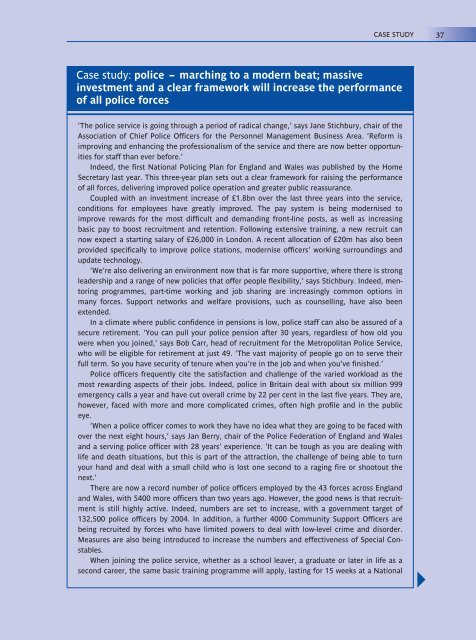The role of human resource management
The role of human resource management
The role of human resource management
You also want an ePaper? Increase the reach of your titles
YUMPU automatically turns print PDFs into web optimized ePapers that Google loves.
Case study: police – marching to a modern beat; massive<br />
investment and a clear framework will increase the performance<br />
<strong>of</strong> all police forces<br />
‘<strong>The</strong> police service is going through a period <strong>of</strong> radical change,’ says Jane Stichbury, chair <strong>of</strong> the<br />
Association <strong>of</strong> Chief Police Officers for the Personnel Management Business Area. ‘Reform is<br />
improving and enhancing the pr<strong>of</strong>essionalism <strong>of</strong> the service and there are now better opportunities<br />
for staff than ever before.’<br />
Indeed, the first National Policing Plan for England and Wales was published by the Home<br />
Secretary last year. This three-year plan sets out a clear framework for raising the performance<br />
<strong>of</strong> all forces, delivering improved police operation and greater public reassurance.<br />
Coupled with an investment increase <strong>of</strong> £1.8bn over the last three years into the service,<br />
conditions for employees have greatly improved. <strong>The</strong> pay system is being modernised to<br />
improve rewards for the most difficult and demanding front-line posts, as well as increasing<br />
basic pay to boost recruitment and retention. Following extensive training, a new recruit can<br />
now expect a starting salary <strong>of</strong> £26,000 in London. A recent allocation <strong>of</strong> £20m has also been<br />
provided specifically to improve police stations, modernise <strong>of</strong>ficers’ working surroundings and<br />
update technology.<br />
‘We’re also delivering an environment now that is far more supportive, where there is strong<br />
leadership and a range <strong>of</strong> new policies that <strong>of</strong>fer people flexibility,’ says Stichbury. Indeed, mentoring<br />
programmes, part-time working and job sharing are increasingly common options in<br />
many forces. Support networks and welfare provisions, such as counselling, have also been<br />
extended.<br />
In a climate where public confidence in pensions is low, police staff can also be assured <strong>of</strong> a<br />
secure retirement. ‘You can pull your police pension after 30 years, regardless <strong>of</strong> how old you<br />
were when you joined,’ says Bob Carr, head <strong>of</strong> recruitment for the Metropolitan Police Service,<br />
who will be eligible for retirement at just 49. ‘<strong>The</strong> vast majority <strong>of</strong> people go on to serve their<br />
full term. So you have security <strong>of</strong> tenure when you’re in the job and when you’ve finished.’<br />
Police <strong>of</strong>ficers frequently cite the satisfaction and challenge <strong>of</strong> the varied workload as the<br />
most rewarding aspects <strong>of</strong> their jobs. Indeed, police in Britain deal with about six million 999<br />
emergency calls a year and have cut overall crime by 22 per cent in the last five years. <strong>The</strong>y are,<br />
however, faced with more and more complicated crimes, <strong>of</strong>ten high pr<strong>of</strong>ile and in the public<br />
eye.<br />
‘When a police <strong>of</strong>ficer comes to work they have no idea what they are going to be faced with<br />
over the next eight hours,’ says Jan Berry, chair <strong>of</strong> the Police Federation <strong>of</strong> England and Wales<br />
and a serving police <strong>of</strong>ficer with 28 years’ experience. ‘It can be tough as you are dealing with<br />
life and death situations, but this is part <strong>of</strong> the attraction, the challenge <strong>of</strong> being able to turn<br />
your hand and deal with a small child who is lost one second to a raging fire or shootout the<br />
next.’<br />
<strong>The</strong>re are now a record number <strong>of</strong> police <strong>of</strong>ficers employed by the 43 forces across England<br />
and Wales, with 5400 more <strong>of</strong>ficers than two years ago. However, the good news is that recruitment<br />
is still highly active. Indeed, numbers are set to increase, with a government target <strong>of</strong><br />
132,500 police <strong>of</strong>ficers by 2004. In addition, a further 4000 Community Support Officers are<br />
being recruited by forces who have limited powers to deal with low-level crime and disorder.<br />
Measures are also being introduced to increase the numbers and effectiveness <strong>of</strong> Special Constables.<br />
When joining the police service, whether as a school leaver, a graduate or later in life as a<br />
second career, the same basic training programme will apply, lasting for 15 weeks at a National<br />
CASE STUDY 37

















